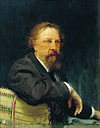- Don Juan (drama)
-
Don Juan Written by Aleksey Konstantinovich Tolstoy Date premiered 1905 Place premiered Adelgeim brothers troupe Original language Russian Genre Drama Don Juan (Russian: Дон Жуан) is an 1862 drama by Aleksey Konstantinovich Tolstoy, first published in the April issue of Russky Vestnik magazine.[1] Don Juan never appeared on stage during its author's lifetime. In 1891, its production was deemed "unsuitable" by censors. The play was staged for the first time ever in 1905 by the Brothers Adelgeim troupe. Later incidental music was written for the play by E. F. Napravnik. P. I. Tchaikovsky set the "Distant Apuljara's lights..." piece to music; it is known as "The Don Juan Serenade".[2]
Background
The origins of the play trace back to the end of 1857, when Aleksey K. Tolstoy first got the initial idea. By the summer of 1858 he's written Don Juans first rough version. On March 20, 1860, he informed his friend Boleslav Markevich the he's "written and re-written the drama, then read it to V.P.Botkin and N.F.Kruze", who gave him their approval. Markevich in his letters criticised many aspects of the play (the need for prologue, the fact that Don Juan doesn't appear in the epilogue, etc) but his opinions were by and large ignored. In the autumn of 1961, though, while in Moscow, Tolstoy recited the piece to Mikhail Katkov and Ivan Aksakov; their remarks were found to be to the point and some amends have been made to the text. In the end of March 1862 A.K.Tolstoy sent the manuscript to Russky Vestnik wishing to see "not a single word being crossed out" from this final version. His demand was instantly accepted and the poem appeared in the April issue of the magazine.[1]
Tolstoy dedicated his Don Juan drama to Mozart and E. T. A. Hoffmann, since the latter (whose short story inspired by Mozart music) was "the first to see in this character not a philanderer but a seeker of high ideal".[3] As a Romanticist Tolstoy attributed to love the divine meaning, believing it to serve as a link between human soul and higher spheres. Unlike the Tirso de Molina hero, his Don Juan acts in a fashion of a true romantic, looking for love "that helps us see through this wonderful set of universal laws, things of our world's hidden beginnings". Tolstoy made Don Juan closer to Faust; some scene and characters (like that of Satan) point to Goethe influence too.[4]
References
- ^ a b А.К. Толстой. Собрание сочинений в 4-х томах. Москва, Художественная литература, 1964. Т 2. Драмы. Стр. 665–668.
- ^ Серенада Дон Жуана. П.И.Чайковский - А.К.Толстой.
- ^ Письмо к Маркевичу от 20 марта 1860 года.
- ^ Ямпольский, И. Г. (1964). "А.К. Толстой. Собрание сочинений в 4-х томах. Т 1. Стихотворения и поэмы. Биография. Ч. 3-8. Стр. 18-52". Москва. Художественная литература.. http://az.lib.ru/t/tolstoj_a_k/text_0020.shtml. Retrieved 2011-01-01.
Works by Aleksey Konstantinovich Tolstoy Drama Don Juan (1862) · The Death of Ivan the Terrible (1864) · Tsar Fyodor Ioannovich (1868) · Tsar Boris (1870)

Poetry Vasily Shibanov (1858) · John of Damascus (1858) · History of the Russian State from Gostomysl to Timashev (1868) · The Dream of Councillor Popov (1873) · Dragon (1875)
Prose The Vampire (1843) · Prince Serebrenni (1862)
Categories:- 1862 plays
- Plays by Aleksey Konstantinovich Tolstoy
Wikimedia Foundation. 2010.
